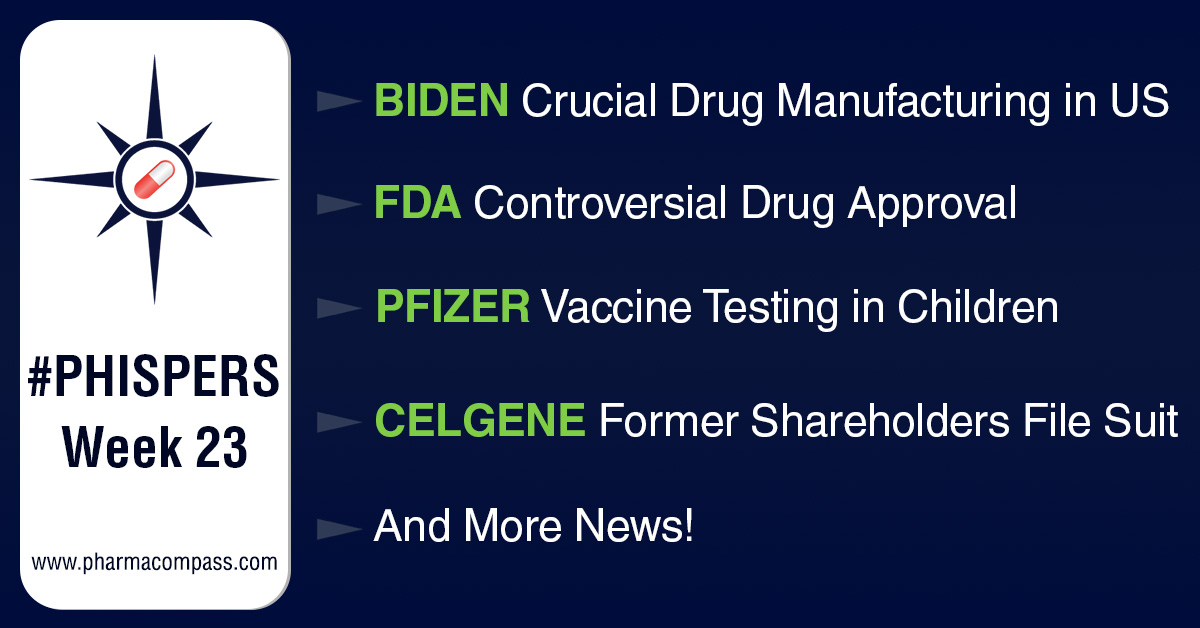
By PharmaCompass
2021-06-10
Impressions: 2,101
This week, Phispers brings you an update on two degenerative diseases that so far have had no treatment options — Alzheimer’s and Parkinson’s disease. The FDA granted an accelerated approval to Biogen’s controversial Alzheimer’s drug — Aduhelm — even as experts said there is not enough evidence that the drug can address cognitive symptoms. And Bayer rolled out early stage trials on cell and gene therapies through its subsidiaries to find a treatment for Parkinson’s disease.
The Biden administration has announced a plan to manufacture more crucial medicines in the US through an expanded use of the Defense Production Act.
Former shareholders of Celgene have slapped a US$ 6.4 billion lawsuit on Bristol Myers Squibb for breaching their contingent value rights (CVR) agreement.
And in Covid news, Pfizer said it will begin testing its vaccine in a larger group of children under the age of 12 after selecting a lower dose of the shot in an earlier stage of the trial.
Biden announces plan to make crucial drugs in US through use of Defense Production Act
On Tuesday, the White House announced key findings from a 100-day review of America’s critical supply chain issues in a 250-page report, and said it will establish a task force to address supply chain challenges in key sectors where there is a mismatch between supply and demand. The task force will focus on “homebuilding and construction, semiconductors, transportation, and agriculture and food”.
On February 24, 2021, President Joe Biden had signed this executive order to assess and strengthen critical supply chains.
The Biden Administration also announced a plan to manufacture crucial medicines in the US through an expanded use of the Defense Production Act, a regulation that gives the US president the authority to direct industrial production for national defense purposes.
The White House said the administration has already taken actions to address the disruption, including expanding vaccine manufacturing and acquiring essential supplies.
The US government’s Covid-19 Response Team has drastically expanded the manufacture of vaccines and other essential supplies, enabling more than 137 million Americans to get fully vaccinated.
The pharmaceutical push is part of a broader strategy to reduce shortages of key goods that Biden says are critical for national security while also making the US more competitive against its main economic rival, China. There was also news on Wednesday that the Biden administration plans to donate 500 million doses of the Pfizer vaccine to nearly 100 countries over the next two years.
Biogen’s controversial Alzheimer’s drug bags FDA’s accelerated approval
This week, the US Food and Drug Administration (FDA) approved Biogen’s aducanumab — the first treatment to attack a likely cause of Alzheimer’s disease. However, the approval was a controversial one since experts are of the view that there is not enough evidence that aducanumab — which will go by the brand name Aduhelm — can address cognitive symptoms.
In a latest development, two members of a panel of external advisors to the FDA have resigned in protest over the agency’s decision to approve Aduhelm, despite the committee’s recommendation against doing so. In November, an 11-member committee had nearly unanimously voted against the drug’s approval, citing inconclusive evidence that the drug was effective.
However, the FDA took that position because it has been under pressure from patients and advocacy groups (including the Alzheimer’s Association) to approve this drug.
Aduhelm is a monthly intravenous infusion intended to slow cognitive decline in people with mild memory and thinking problems. It is the first approved treatment to attack the disease process of Alzheimer’s, instead of just addressing the concomitant symptoms of dementia.
Aducanumab works by removing sticky deposits of a protein called amyloid beta from the brains of patients in earlier stages of Alzheimer’s disease. This staves off the damages caused by the disease, such as memory loss and the inability to care for oneself.
On its website, the FDA said results from clinical trials of aducanumab were mixed, but the drug demonstrated a reduction in amyloid beta plaques in the brain, which is likely to benefit patients. Experts also say that the drug slows disease progression of Alzheimer’s better than any drug to date. “We decided that the accelerated approval pathway fits well here,” Patrizia Cavazzoni, director of the FDA’s Center for Drug Evaluation and Research, told Reuters.
“This is good news for patients with Alzheimer’s disease,” said Ronald Petersen, an Alzheimer's disease expert at the Mayo Clinic. However, he said “this is not a cure. It’s hoped that this will slow the progression of the disease.”
What has further raised concerns is the list price of the drug. Biogen announced Aduhelm’s list price at US$ 56,000 a year. In addition, patients have to bear the expenses of diagnostic testing and brain imaging. If the drug’s efficacy is transient, billions of dollars will have been spent on a flawed drug. According to experts, drugs that act on the central nervous system (CNS) are notorious for giving false positive results due to large placebo effects.
Recognizing that clinical trials of the drug had provided incomplete evidence, the FDA has granted approval for the drug but requires Biogen to conduct a new clinical trial.
Biogen’s CEO told CNBC that the company has up to 9 years to complete the confirmatory trial. In the meantime, Biogen will generate real-world data as well to know the benefits of the drug. Should the Biogen confirmatory study fail, the FDA will most certainly face the consequences for lowering its own standards.
Meanwhile, Biogen has said it expects to begin shipping Aduhelm in about two weeks and has prepared more than 900 healthcare centers for the intravenous infusion treatment.
Former Celgene shareholders slap US$ 6.4 billion lawsuit on BMS for breaching CVR agreement
In January 2019, when Bristol Myers Squibb (BMS) announced the acquisition of Celgene for US$ 74 billion, it had tied contingent value rights (CVR) to the approval of three drugs that were experimental at the time.
According to the CVR agreement, BMS was to give former Celgene shareholders US$ 6.4 billion if it won FDA approval for ozanimod and liso-cel by the end of 2020 and for ide-cel by March 31, 2021. If even one of the three drugs missed their deadlines, BMS would owe these shareholders nothing.
When liso-cel, a new CAR-T drug to treat non-Hodgkin lymphoma, didn’t meet the FDA approval deadline of December 31, 2020, the former Celgene shareholders lost out on receiving the payment.
But now, Kansas City-based UMB Bank NA, acting as a trustee for Celgene’s former shareholders, has filed a lawsuit, wherein UMB contends that BMS breached the CVR agreement by failing to apply “diligent efforts” to secure the approval, and also blames BMS for “blatant misconduct”. UMB is looking for US$ 6.4 billion in restitution. And industry observers say they saw this coming.
Liso-cel had won its expedited review process in February 2020, setting up an initial PDUFA date of August 17, 2020. This date would have come well ahead of the December 31 deadline. However, two months later, BMS submitted new data requiring a “major amendment” to the BLA, delaying the PDUFA to November 2020, says the lawsuit.
UMB claimed this extra submission to the FDA was “highly atypical” and accused BMS of excluding safety and efficacy data from the original application, as well as withholding details ensuring that the data was valid. The trustee also alleged that the company “failed to take the steps necessary to prepare two liso-cel manufacturing facilities for FDA inspections.”
Liso-cel was eventually approved in February, about five weeks after the CVR deadline. The CAR-T treatment is now commercially known as Breyanzi. Had BMS made diligent efforts to secure approval, liso-cel would have been approved much sooner, UMB said.
Earlier this year, a BMS spokesman said the company would have met the milestone for liso-cel were it not for “Covid-related inspection delays.”
Pfizer to start testing lower dose of its mRNA jab on children below 12
This week, Pfizer said it will begin testing its Covid-19 vaccine in a larger group of children under the age of 12 after selecting a lower dose of the shot in an earlier stage of the trial. The company said it will enroll up to 4,500 children at more than 90 clinical sites in the US, Finland, Poland and Spain for the study.
Based on safety, tolerability and the immune response generated by 144 children in a phase I study of the two-dose shot, Pfizer said it will test a dose of 10 micrograms in children between five and 11 years of age, and 3 micrograms for the age group of six months to five years.
A Pfizer spokesperson said the company expects data from five- to 11-year-olds in September and plans to seek emergency use authorization (EUA) from regulators in the same month. Data for children in the two to five age group could arrive soon after that, he said.
Pfizer expects to have data from the six-month to two-year-old age group sometime in October or November.
The Pfizer-BioNTech vaccine has been authorized for use in 12 to 16 year old children in Europe, the US and Canada. They receive the same dose as adults: 30 micrograms. According to the US Centers for Disease Control and Prevention, nearly 7 million teens have received at least one dose of the vaccine in the US.
Bayer begins trials on cell and gene therapies to cure Parkinson’s disease through its subsidiaries
Alzheimer’s wasn’t the only degenerative disease that saw some positive developments. Bayer AG made some headway in the treatment of Parkinson’s disease — it announced that its wholly-owned subsidiary BlueRock Therapeutics, a clinical stage biopharmaceutical company, has successfully administered the first dose of its pluripotent stem cell-derived dopaminergic neurons, named DA01, to a Parkinson’s disease patient in their open-label Phase 1 clinical study.
Alongside, another Bayer wholly-owned company specializing in gene therapy — Asklepios BioPharmaceutical Inc (AskBio) — said it is recruiting and evaluating Parkinson’s disease patients in an ongoing Phase 1b clinical study.
“The potential of BlueRock and AskBio’s clinical candidates to treat Parkinson’s disease could be immense,” said Wolfram Carius, head of cell and gene therapy at Bayer. “For the first time, it might be possible to stop and reverse this degenerative disease and truly help patients with their high unmet medical need. We are still in early phases of clinical trials, but passionately committed to advancing breakthrough science to dramatically improve the lives of patients who have been waiting for way too long for innovative treatments.”
Parkinson’s disease impacts more than 10 million people worldwide. Dopamine substitutes, such as levodopa, are commonly used to mitigate the symptoms of the disease, but their effect diminishes with the progression of the disease.
Bayer is hoping its stem cell and gene therapy programs might address the root cause of Parkinson’s disease. “For the first time, it might be possible to stop and reverse this degenerative disease and truly help patients with their high unmet medical need,” said Wolfram Carius, head of cell and gene therapy at Bayer. “The start of clinical trials represents the beginning towards a truly breakthrough treatment option to dramatically improve the lives of patients.”
The PharmaCompass Newsletter – Sign Up, Stay Ahead
Feedback, help us to improve. Click here
Image Credit : Phisper Infographic by SCORR MARKETING & PharmaCompass is licensed under CC BY 2.0
“ The article is based on the information available in public and which the author believes to be true. The author is not disseminating any information, which the author believes or knows, is confidential or in conflict with the privacy of any person. The views expressed or information supplied through this article is mere opinion and observation of the author. The author does not intend to defame, insult or, cause loss or damage to anyone, in any manner, through this article.”








